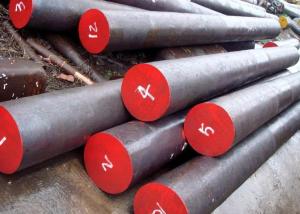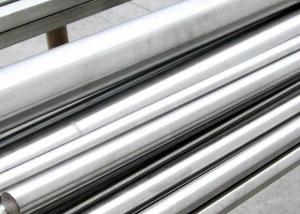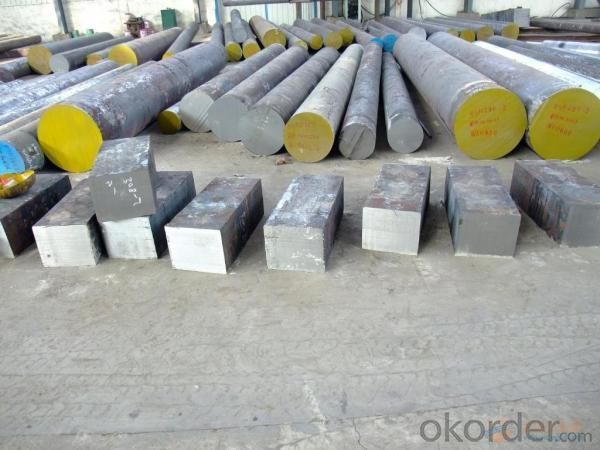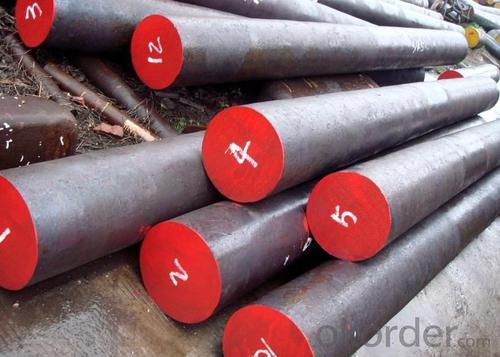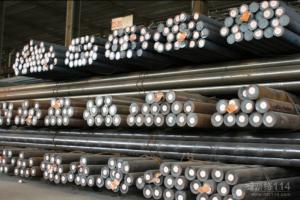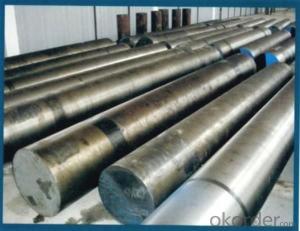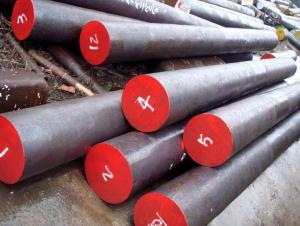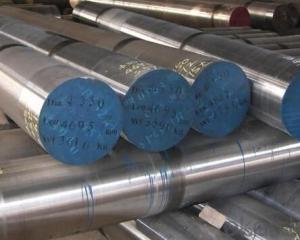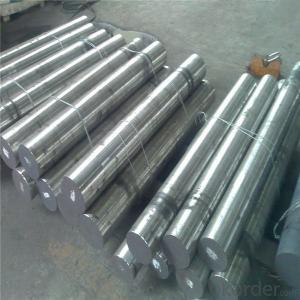Special Steel For Bearing
- Loading Port:
- Guangzhou
- Payment Terms:
- TT or LC
- Min Order Qty:
- 25MT m.t.
- Supply Capability:
- 600000 Tons/Year m.t./month
OKorder Service Pledge
OKorder Financial Service
You Might Also Like
Specifications of Special Steel For Bearing
|
Standard |
AISI, ASTM, BS, DIN, GB, JIS |
|
Dimension |
Diameter: 50mm-500mm Length: 2000-5800mm |
|
Grade |
GCr15, SAE 52100, L3, 1.2067/100Cr6 |
|
Surface treatment |
Black/machined/turned/polished |
|
Technology |
EF/ESR/EAF+VD+LF |
|
Inspection |
100% UT According to En1921D/d |
|
Certificate |
ISO9001: 2008 |
Main Markets: North America, South America, Eastern Europe, Southeast Asia, Africa, Oceania, Mid East, Eastern Asia, Central America, Northern Europe, Southern Europe
Chemical Composition:
China GB, GCr15: C: 0.95-1.05; Si: 0.15-0.35; Mn: 0.25-0.45; Cr: 1.40-1.65
USA AISI, L3: C: 1; Si: 0.50; Mn: 0.25-0.50; Cr: 1.10-1.70
German DIN, 1.2067: C: 0.95-1.10; Si: 0.15-0.35; Mn: 0.25-0.40; Cr: 1.40-1.70
France NF, 100Cr6: C: 0.95-1.10; Si: 0.10-0.35; Mn: 0.20-0.40; Cr: 1.35-1.60
Usage and Applications of Special Steel For Bearing
Wire drawing die/ Heading die
High Quality Bearing steel is used for manufacturing ball, roller bearing steel and rings. Bearing in work is under great pressure and friction, so have high demands bearing steel and hardness and resistance, and high elastic limit.
Bearing steels are used for ball and roller bearing applications and are comprised of low carbon steels and high carbon through harden able steel.
For example, bearing ring, steel rolling mill, machinery, 100Cr6 bearing steel ball is widely used in high-speed and low-noise bearing, bicycle, motorcycle, automobile, bags electronically.
Packaging & Delivery of Special Steel For Bearing
Packaging Detail: Standard seaworthy packing or as customer required.
Delivery Detail: 45 days
Trade terms: FOB, CFR, CIF
MOQ: 25 tons or at customer's demands
Shape of Special Steel For Bearing
Round bar/Flat sheet/steel flat
1. Round: forged steel, rolled steel, drawing steel, polishing steel
2. Abnormal shape: quadrilateral steel, hexagons steel
3. Flat steel
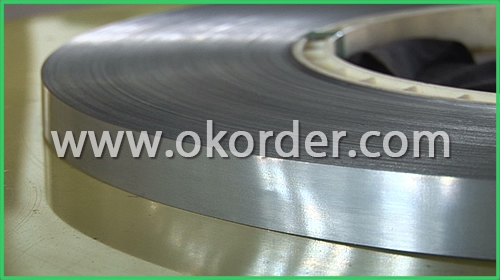
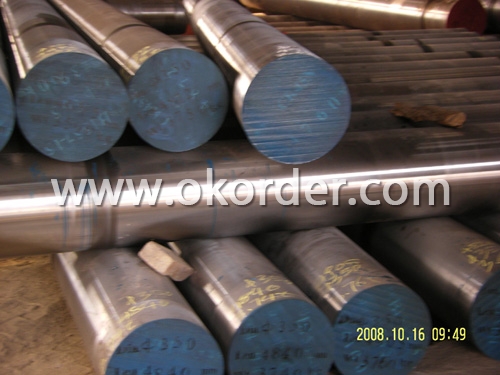

Other Size of Special Steel for Bearing
|
Round |
Diameter |
Length | |
|
50mm-500mm |
2000mm-5800mm | ||
|
Steel plate |
Thickness |
Width |
Length |
|
20-400mm |
80-1000mm |
2000mm-5800mm | |
Characteristics of Special Steel for Bearing
1. High carbon bearing steel
2. High strength and abrasion resistance
3. Low alloy and high fatigue property
4. With strong technical force, better reliability, high quality, competitive price, fast leading time and excellent after-sales service, we have gained a good reputation from our customers.
Quality Assurance of Special Steel for Bearing
We are the ISO 9001:2008 authentication enterprises and we can provide the enterprise's quality written guarantee for all the exported products.
Certificate of quality is issued in English, in addition the normal terms, production process, the mechanical property (yield strength, tensile strength, elongation and hardness. forged ratio, UT test result, Grain size, heat treatment methods and the sample of is shown on the certificate of quality.
Management Certification: ISO 9001:2000, QS-9000, ISO 14001:2004
- Q: What are the main characteristics of high-speed steel?
- High-speed steel (HSS) is a type of tool steel that is widely used in machining applications due to its exceptional properties. The main characteristics of high-speed steel include: 1. Superior Hardness: HSS is known for its remarkable hardness, which allows it to withstand high temperatures and resist wear. This hardness is achieved through the addition of various alloying elements like tungsten, molybdenum, cobalt, vanadium, and chromium. 2. Excellent Heat Resistance: High-speed steel has exceptional heat resistance, enabling it to maintain its hardness and strength even at elevated temperatures. This property is crucial in applications where the tool needs to withstand high cutting speeds and generate significant amounts of heat. 3. Good Toughness: HSS possesses good toughness, which means it can resist cracking and chipping under heavy loads or impact. This characteristic ensures that the tool can endure demanding cutting conditions without premature failure. 4. High Wear Resistance: HSS exhibits high wear resistance, making it suitable for cutting, drilling, and milling operations. It can withstand prolonged usage without losing its sharpness or performance, resulting in extended tool life. 5. Versatility: High-speed steel is highly versatile and can be used for a wide range of applications, including cutting, shaping, and forming various materials such as metals, plastics, and wood. Its versatility makes it a popular choice in industries like manufacturing, automotive, aerospace, and construction. 6. Ease of Machining: HSS can be easily machined and shaped into different tool designs, which allows for customization and optimization based on specific applications. This characteristic makes it a preferred material for manufacturing cutting tools like drills, end mills, taps, and saw blades. 7. Cost-Effective: Compared to other high-performance tool materials like carbide, high-speed steel is relatively more cost-effective. It provides a balance between performance and affordability, making it a cost-efficient choice for many machining applications. In conclusion, high-speed steel is valued for its exceptional hardness, heat resistance, toughness, wear resistance, versatility, ease of machining, and cost-effectiveness. These characteristics make it a preferred material for a wide range of cutting tools, ensuring efficient and reliable machining operations.
- Q: What are the different heat treatment processes used for special steel?
- There are several heat treatment processes used for special steel, including annealing, normalizing, quenching, tempering, and case hardening. Annealing involves heating the steel to a specific temperature and then slowly cooling it to soften it and improve its machinability. Normalizing is similar to annealing but involves cooling the steel in air instead of slowly. Quenching involves rapidly cooling the steel to increase its hardness, while tempering involves reheating the quenched steel to a lower temperature to reduce brittleness and improve toughness. Case hardening is a process where the outer layer of the steel is hardened while maintaining a softer core, enhancing wear resistance.
- Q: How is special steel used in the manufacturing of cutting tools?
- Special steel is used in the manufacturing of cutting tools because of its high hardness, toughness, and wear resistance. This type of steel can be heat-treated to achieve the desired hardness and can retain its cutting edge for a longer period. It is commonly used in the production of drills, saw blades, and milling cutters to ensure efficient and precise cutting operations.
- Q: What are the different methods of preventing intergranular corrosion in special steel?
- Various techniques are available for preventing intergranular corrosion in special steel. 1. Heat Treatment: A highly effective approach involves subjecting the steel to solution annealing, a heat treatment process. This method entails heating the steel to a high temperature and rapidly cooling it. By doing so, any precipitates or carbides that may have formed along the grain boundaries are dissolved, thereby reducing the risk of intergranular corrosion. 2. Alloying: Another strategy is to introduce specific alloying elements into the steel composition. For instance, the addition of elements such as chromium and molybdenum can enhance the steel's resistance to intergranular corrosion. These alloying elements create a protective oxide layer on the surface, preventing corrosion along the grain boundaries. 3. Passivation: Passivation involves treating the steel surface with chemicals that establish a protective layer. This layer acts as a barrier, safeguarding the grain boundaries from the corrosive environment. Common passivation techniques include acid pickling and electrochemical methods. 4. Sensitization Control: Particular attention must be given to controlling the sensitization process. Sensitization occurs when the steel is exposed to high temperatures for an extended period, resulting in the precipitation of chromium carbides along the grain boundaries and rendering the steel vulnerable to intergranular corrosion. By carefully controlling the heating and cooling rates during processing, sensitization can be minimized or prevented. 5. Corrosion Inhibitors: Another option is the utilization of corrosion inhibitors, which are chemicals that can be applied to the steel surface to protect it from corrosion. These inhibitors form a protective film on the surface, preventing corrosive agents from attacking the grain boundaries. It is important to consider that the choice of method depends on the specific type of special steel and its intended application. Selecting the most suitable approach requires a comprehensive understanding of the steel's composition, processing conditions, and the expected corrosive environment.
- Q: How does special steel perform in low-temperature environments?
- Special steel, also known as low-temperature steel, is specifically designed to perform exceptionally well in low-temperature environments. One of the key features of special steel is its ability to maintain its strength and toughness even at extremely low temperatures. This is crucial in industries such as oil and gas, where equipment and structures are exposed to extreme cold conditions. When exposed to low temperatures, regular steel tends to become brittle and lose its mechanical properties, making it prone to cracking and failure. However, special steel is formulated with specific alloying elements, such as nickel, chromium, and molybdenum, which enhance its low-temperature performance. These alloying elements help to prevent the formation of brittle phases, which allows the steel to retain its toughness and ductility even at sub-zero temperatures. Special steel is extensively used in cryogenic applications, where temperatures can reach as low as -196 degrees Celsius (-320 degrees Fahrenheit). It is commonly employed in the construction of cryogenic storage tanks, liquefied natural gas (LNG) carriers, and other components that come into contact with extremely cold fluids or gases. In low-temperature environments, special steel not only maintains its mechanical properties but also exhibits excellent resistance to corrosion. This is vital, as low temperatures can exacerbate corrosion issues in many materials. The corrosion resistance of special steel is attributed to its high nickel content, which forms a protective oxide layer that prevents the steel from corroding, even in harsh conditions. Overall, special steel is specifically engineered to withstand the challenges posed by low-temperature environments. Its ability to retain strength, toughness, and corrosion resistance makes it an ideal choice for various industries operating in extreme cold conditions.
- Q: What are the specific requirements for special steel used in the mining drill bit industry?
- The mining drill bit industry has specific requirements for the special steel it utilizes, which focus on durability, toughness, and resistance to wear and corrosion. To begin with, the steel employed in mining drill bits must possess exceptional durability to endure the harsh and demanding conditions found in the mining environment. The drill bits are exposed to high levels of impact, vibration, and stress, necessitating high strength and hardness in the steel to prevent deformation or breakage. Moreover, toughness plays a crucial role in drill bit steel as it must withstand the repetitive and intense forces encountered during drilling operations. The steel should exhibit good fracture toughness to resist crack propagation and prevent premature failure. Additionally, wear resistance is of utmost importance for drill bit steel, as it must retain its cutting edge and performance over long periods. The steel needs to have high wear resistance to withstand the abrasive nature of the rocks and minerals being drilled. Furthermore, apart from wear resistance, the steel utilized in mining drill bits must also demonstrate resistance to corrosion. The mining environment often involves exposure to water, chemicals, and various corrosive agents. Hence, the steel should possess suitable corrosion resistance properties to prevent rusting and degradation. In conclusion, the special steel employed in the mining drill bit industry must fulfill these specific requirements of durability, toughness, wear resistance, and corrosion resistance to ensure reliable and efficient drilling operations in the mining sector.
- Q: What are the different methods of machining special steel?
- There are several different methods of machining special steel, each with its own advantages and applications. Some of the most common methods include: 1. Turning: Turning is a machining process that involves rotating a workpiece while a cutting tool removes material from the surface. This method is typically used to create cylindrical shapes and can produce high-quality finishes. 2. Milling: Milling is a versatile machining method that uses rotary cutters to remove material from a workpiece. It can be used to create complex shapes and contours, and is often employed in the production of special steel components. 3. Drilling: Drilling is a machining process that involves creating holes in a workpiece using a rotating cutting tool. It can be used to create both through holes and blind holes in special steel, and is commonly used in various industries. 4. Grinding: Grinding is a precision machining method that uses an abrasive wheel to remove material from a workpiece's surface. It is often used to achieve tight tolerances and smooth finishes on special steel components. 5. Broaching: Broaching is a machining process that uses a sharp cutting tool with multiple teeth to remove material in a series of linear cuts. It is commonly used to create keyways, splines, and other intricate shapes in special steel. 6. Electrical Discharge Machining (EDM): EDM is a non-traditional machining method that uses electrical discharges to remove material from a workpiece. It is particularly useful for machining special steel with complex shapes or for creating small features. 7. Laser Cutting: Laser cutting utilizes a high-powered laser to cut through special steel with extreme precision. It is commonly used for intricate designs and can produce smooth edges without the need for subsequent processing. Each of these methods has its own advantages and limitations, and the choice of machining method depends on factors such as the desired outcome, the complexity of the part, and the properties of the special steel being machined.
- Q: How does special steel contribute to the manufacturing of surgical instruments?
- Special steel, also known as stainless steel, plays a crucial role in the manufacturing of surgical instruments. The unique properties of special steel make it an ideal material for producing high-quality surgical instruments that are used in various medical procedures. Firstly, special steel is highly resistant to corrosion and rust. Surgical instruments are constantly exposed to bodily fluids, sterilization processes, and harsh cleaning agents. The corrosion resistance of special steel ensures that these instruments remain durable and can withstand repeated use and cleaning without losing their integrity. Secondly, special steel has excellent strength and hardness properties. Surgical instruments need to be sturdy and able to withstand the forces and pressures exerted during surgeries. The high strength and hardness of special steel ensure that these instruments retain their shape and sharpness even after multiple uses, reducing the risk of breakage or deformation during critical procedures. Moreover, special steel is biocompatible, meaning it does not react with bodily tissues or fluids. This is crucial for surgical instruments that come into direct contact with patients' bodies. The biocompatibility of special steel ensures that there are no adverse reactions or complications when these instruments are used in surgeries, minimizing the risk of infections or other complications. Additionally, special steel can be easily machined and fabricated into intricate shapes and designs. Surgical instruments require precision and accuracy to perform their intended functions effectively. The machinability of special steel allows manufacturers to create complex instruments with fine details and features, ensuring their optimal performance during surgical procedures. Furthermore, special steel can be sterilized efficiently. Sterilization is a critical step in ensuring the safety and effectiveness of surgical instruments. Special steel's ability to withstand high temperatures and various sterilization methods, such as autoclaving or ethylene oxide gas sterilization, makes it an ideal material choice for surgical instruments. In conclusion, special steel contributes significantly to the manufacturing of surgical instruments due to its corrosion resistance, strength, biocompatibility, machinability, and sterilization capabilities. These properties ensure that surgical instruments made from special steel are durable, reliable, safe, and effective in medical procedures, ultimately contributing to the overall success of surgeries and patient outcomes.
- Q: How does the demand for special steel vary across different regions?
- The demand for special steel varies across different regions due to several factors such as industrial development, infrastructure projects, and manufacturing activities. Regions with robust manufacturing sectors and infrastructure development tend to have higher demand for special steel as it is used in various applications like automotive, construction, and machinery. Additionally, regions with a higher focus on technological advancements and innovation may also have a greater demand for special steel due to its unique properties and capabilities. However, regions with limited industrial activities or dependence on specific sectors may exhibit lower demand for special steel. Overall, the demand for special steel is influenced by the specific economic and industrial characteristics of each region.
- Q: How does special steel contribute to electrical conductivity?
- Special steel contributes to electrical conductivity by having specific alloying elements, such as chromium, nickel, and manganese, that enhance the material's conductivity properties. These alloying elements improve the steel's ability to carry electrical current by increasing its electron mobility and reducing resistance. Additionally, special steel can be heat-treated to further optimize its electrical conductivity, making it suitable for various electrical applications.
1. Manufacturer Overview
| Location | Guangdong, China |
| Year Established | 2005 |
| Annual Output Value | Above US$ 100 Million |
| Main Markets | korea, India, Malaysia, Brazil, Germany, Belgium, Middle East |
| Company Certifications |
2. Manufacturer Certificates
| a) Certification Name | |
| Range | |
| Reference | |
| Validity Period |
3. Manufacturer Capability
| a) Trade Capacity | |
| Nearest Port | Guangzhou |
| Export Percentage | 50%-80% |
| No.of Employees in Trade Department | 21-100 People |
| Language Spoken: | English; Chinese |
| b) Factory Information | |
| Factory Size: | 23,000 square meters |
| No. of Production Lines | 1 |
| Contract Manufacturing | OEM servise offered |
| Product Price Range | high; average |
Send your message to us
Special Steel For Bearing
- Loading Port:
- Guangzhou
- Payment Terms:
- TT or LC
- Min Order Qty:
- 25MT m.t.
- Supply Capability:
- 600000 Tons/Year m.t./month
OKorder Service Pledge
OKorder Financial Service
Similar products
Hot products
Hot Searches
Related keywords
